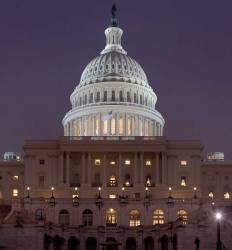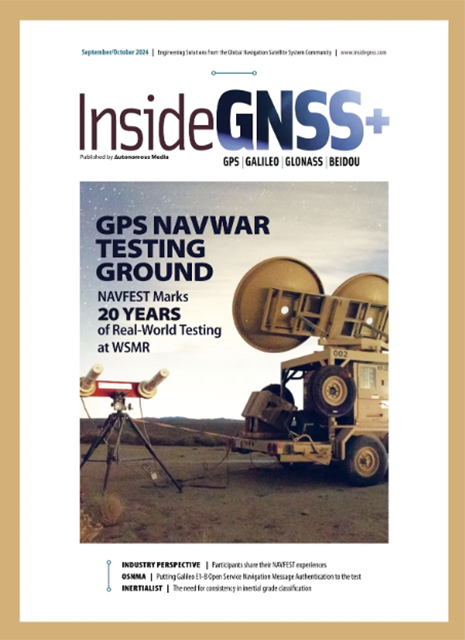There are congressional caucuses dedicated to building support for everything from auto care and addiction treatment to chickens and Vietnam. Some caucuses become powerful voting blocks of lawmakers — the House Freedom Caucus played a role in the 2015 resignation of Speaker John Boehner. Others exercise influence by educating congressmembers and their staff about issues impacting their cause and quietly heading off ill-conceived proposals before they get too far along.
Now there is a new caucus dedicated to raising awareness about the wide-ranging economic and societal benefits of GPS. The newly launched Global Positioning System (GPS) Caucus counts as its inaugural members Senators Joni Ernst (R-Iowa) and Tammy Duckworth (D-Illinois), and Representatives Dave Loebsack (D-Iowa) and Don Bacon (R-Nebraska).
“GPSIA applauds Senators Ernst and Duckworth and Representatives Loebsack and Bacon for their leadership in establishing the GPS Caucus as a platform for highlighting the ever-increasing importance of GPS technologies to our economy and infrastructure,” said GPS Innovation Alliance (GPSIA) Executive Director David Grossman. “We look forward to working with congressional leaders through the caucus to further GPS innovation, creativity and entrepreneurship.”
GPS and the Economy
In addition to helping bring the caucus together, Duckworth and Loebsack introduced a resolution recognizing “the importance of continuous availability, accuracy, reliability, and resiliency of the Global Positioning System constellation” and “the contributions made by the men and women of the Air Force who are responsible for operating and maintaining the Global Positioning System constellation.”
Bacon co-sponsored the resolution in the House while the language was co-sponsored in the Senate by Ernst as well as Jeff Merkley (D-Oregon) and Maggie Hassan (D-New Hampshire).
The resolution underscores the role that GPS plays in the economy, making clear that GPS-enabled precision agriculture has so far boosted the U.S. agriculture sector by a total of some $8.2 billion in saved coasts and increased yields. House Resolution 219 also points out that GPS not only aids in emergency response but also “has proven to be an essential tool in facilitating social and economic activity.” For example, the resolution says:
- The geospatial services ecosystem, which is supported by GPS, is estimated to drive $1.6 trillion in revenues and $1.4 trillion in cost savings throughout the United States economy.
- GPS-enabled internet publishing, broadcasting, and search portals have accounted for $87 billion in revenue and supported 181,000 jobs.
- GPS enables location-based services that will enhance the $950 billion app economy, supporting 4.7 million jobs across the United States.
- GPS has proven to be essential to the foundation of the ridesharing industry accessed on smartphones, valued at close to $61 billion.
Why It’s Important
The enumeration of these benefits is remarkable because it reflects a change in congressional understanding about how important GPS has become.
In 2011 the Federal Communications Commission came extremely close to approving a proposal by a Virginia company to repurpose satellite frequencies close to those used by GPS and other satellite navigation systems. LightSquared, now called Ligado Networks, wanted to use those frequencies to support a nation-wide terrestrial, broadband network comprising some 40,000 ground stations. That network, tests showed, would have overloaded the vast majority of GPS receivers. The battle over the issue shifted to the halls of Congress where it seemed some lawmakers were persuaded that the risk to GPS was overblown. The debate reached a turning point, however, when Gen. William Shelton, the head ofAir Force Space Command, testified before the House Armed Services Committee about the seriousness of the GPS interference problem — despite reported pressure from the White House to moderate his position. (Ligado has since modified its terrestrial plan but concerns about GPS interference remain.)
What was not fully known at the height of the debate is that an amazing array of private sector industries had already come to rely on the timing data in the GPS signal to manage their systems. Studies arising from the LightSquared debate made clear that GPS had become integral to the nation’s telecommunication, financial and transportation networks. The Department of Homeland Security now considers GPS to be essential to 14 of the 16 industries that are classified as part of the nation’s critical infrastructure.
The creation of the GPS Caucus not only establishes a potential base of political support, it creates a mechanism to educate lawmakers and the staff about GPS and help address new issues that may arise in the future.
As a first step Duckworth and Loebsack will speak April 2 at the GPS 101 briefing for Congressional staff. The free briefing, which is sponsored by GPSIA, will cover the importance of GPS to the U.S. economy and some of the policy and regulatory issues associated with protecting, promoting and enhancing GPS.






